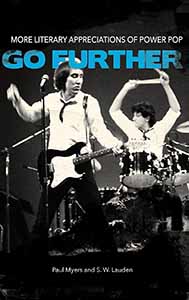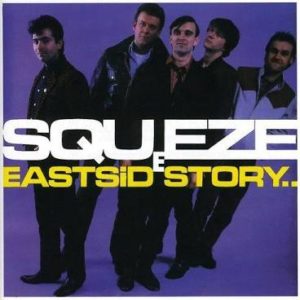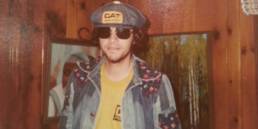
Chris Difford, Glenn Tilbrook: your music is my joy machine. Now here’s why you once owed me five hundred bucks.
On college party nights my junior year, friends would cram into my boxy, stucco apartment for our peculiar brand of artistic appreciation. Once properly pie-eyed from the available intoxicants, we’d bang the drum our way. We’d select our favorite song, assume a handstand against the wall, and then allow pals to hoist us up to the ceiling to “moonwalk” upside-down to the beat. While none of us pretended to be a 180-degreed Michael Jackson, dirty heels were imprinted to the quality rock — the Police, U-2, Cheap Trick — thumping through my Sony speakers.
I, however, only inverted myself for you.
Squeeze was the sound I’d been waiting for from the black hole left by John Lennon’s murder and the shallow onslaught of hair-metal. When “In Quintessence” hit that record needle, I went up. Speedy guitar paired with mordant lyrics, in this case about a blowhard adolescent with a pretend girlfriend, ignited something in me.
He smokes himself into double vision
Leaves his mind on indecision
Thinks he’s invented imagination
Says that god is some relation
You know who didn’t have any imagination? My tightwad landlord, who at semester’s end eyeballed white ceiling tiles mucked like a mosh pit and declared that I wouldn’t be getting back my security deposit. So, thank you for that.
And bless you for everything else.
For forty-odd years, Squeeze has remained one those mystifying talents whose exceptional catalogue many Americans pop connoisseurs somehow overlooked. Was it because, like The Kinks before them, their feisty independence, their refusal to prostrate themselves to label A&R men made them slippery to pigeonhole? Or, perhaps they were just the right band at the wrong time.
Think about them as a National Geographic special might. Squeeze’s dominant characteristic would be Chris and Glenn singing in octave-apart voices that are somehow familiar and always infectious. Its natural habitat: the pebbly streets and sandy roads of England from which they mined “kitchen-sink dramas” that make you laugh, weep, or simply marvel how they pulled it off. Its growl: Telecaster-fueled arrangements that know when to showcase six-string chops and when to recede for melodies and mesage. Zoological superpower? Easy. The ability to produce a lightness of being in those who encircle it for pleasure.
I was in the crowd at an Orange County amphitheater to see them after graduation, knowing that their precocious success had thrust them so close to the sun that they’d had to reconstitute after dissolving. I cared little of melted wings, hearing, on one stage, music pulsing with New Wave synthesizers and nods to Elvis, rockabilly-beats and exotic guitar hooks that’d have Jimmy Page a smidge green. Squeeze’s, oft-sardonic lyrics about hapless romance were just as identifiable as its style was versatile, too. When they crooned “if I didn’t love I’d hate you,” I grinned, because that’s how I periodically felt about the beautiful, mercurial girlfriend next to me that evening (a feeling no doubt reciprocated by her … as someone else future’s belle).
Listening then, after seeing so many performers who filled set lists with libidinous and macho themes that disclosed little about the human condition, was a reminder of the brawn of pithy, tactile descriptions. In the elegiac “Vanity Fair,” there’s the dropout who “paints her nails on the bathroom scales.” In the giddy “Piccadilly,” you smell the yellow curry en route to fireplace nooky. In fan favorite “Up the Junction,” you wince for the man who lost everything after “the devil came and took (him) from bar to street to bookie.” In “Revue,” you giggle as the boys skewer a nose-picking, D-list TV host in his “dickie bow ties.”
***
The best pop songwriters you probably only recall from their radio hits or MTV videos were spawned by Chris’ magnificent lie. With fifty pence he swiped from his mother’s purse, he posted an ad in a London sweet-shop window. Wanted: guitarist “into” the Beatles, Small Faces, Glenn Miller, and others “for (a) band with record deal and touring.” When a younger, shoeless teen in pink trousers turned up about the solicitation, he found that there was neither an established group nor sealed contract. But why quibble when you’re a match introduced to kindling?
Chris, nineteen, was jet-black haired and shy behind his cockiness, a once chubby kid with dyslexia, imaginary friends, a knack for poetry, and a gypsy’s prediction he’d discover happiness through music. After reading a Pete Townsend interview about the globetrotting rockstar life, he decided the gypsy was right. Glenn, with his long nose and slight lisp, was a more extroverted persona and the organic musician between them. Like Chris, he was also a minor rebel (though never a petty criminal like Chris once was). He’d been booted out of school for refusing to shear his hippy-long blond locks. Chris first noticed him sitting in a flower bed playing guitar like a “beardless Jesus.”
The working-class boys united by musical sensibilities and older brothers with health issues penned a hundred and thirty-seven songs in a flash flood of creativity in 1973 and 1974. Frequently, they wrote in all-nighters pungent with candles, weed, and ambition. As the pop-rock world slobbered over Goodbye Yellow Brick Road and Band on the Run, the fresh-faced lads were chiseling their future. A future where they’d sell out Madison Square Gardens, earn a Grammy nomination, and appear on “Saturday Night Live” and “Late Night with David Letterman.” A tomorrow where they’d become an English heritage act, the subject of a BBC documentary, and count Elton John, Paul McCartney, and Dave Edmund as enthusiasts.
Two became one in their songwriting ritual. Chris would scribble lyrics on notepaper, sometimes without lifting pen from pad, and leave them for Glenn. He’d vanish for days or weeks, and then, like a hermit Svengali, slip his much fussed-over arrangements on a cassette under the door for his partner’s delighted ears. Miles Copeland, their first manager, realized they could be huge.
Initially, they performed originals and covers, playing for beer money. They saw contemporaries in Dire Straits and regarded the Sex Pistols as annoying. Rounding out their lineup was now the effervescent Jools Holland on piano and keyboard, the resourceful Gilson Lavis on drums, and the first of several bass players. John Cale, formerly of the Velvet Underground, produced their maiden album by pressuring them to lean into punk rock. While they untucked shirts and affixed clothespins for his benefit, it was an unnatural fit for pop rock troubadours who tilted New Wave with a melodious ethos. Shazam! In “Take Me I’m Yours,” a marching, synchro-beat propels a traveler journeying across the desert toward belly dancers on a tired camel. Deejays and younger audiences hearing their original sound thirsted for more.
Their first US tour wasn’t exactly screaming girls and popping flashbulbs, just the same. At their debut gig, they jammed before an audience of a man and a dog. By the second set, the dog was gone. Oh, well: they traveled in a van, gelling and growing, with Lavis doing his wild-man Keith Moon impression. Their second album, Cool for Cats, reflected musical growth hormone. In “Goodbye Girl,” the repeating keyboard mimics the quixotic heart of a man who awakens from a one-night stand, “on the lino,” with a woman who stole him blind. While Glenn was the Squeeze’s front man on vocals and guitar, Chris, who played rhythm, sang the title song in a gravelly, cockney rasp. Seamlessly, heightened with narrative storytelling that belied his youth, he transitions from cowboys and Indians to his own life as a local celebrity who fraternizes with local mobsters and groupies, the later of whom gave him “a nasty little rash.”
Argybargy, their follow-up, better defined Squeeze in the music-verse as more eclectic than The Cure, less abstract than Depeche Mode, and, arguably, as reliably toe-tapping as Jeff Lynne’s ELO. There were rockers like “Pulling Mussels (From a Shell), which explodes out of the chute, and “Another Nail in My Heart” with its footfalls riff and silky, almost whimsical lead. Deeper in was “Vicky Verky,” a bubble-gum-fast ditty exploring forbidden love and abortion, and the boogie-woogie of “Funny How It Goes” about hitting on “champagne women.” Heard live, you’d swear that not only was the entire band playing on speed but the song themselves had dipped into the rainbow diet pills.
Then drumroll to legend status. The record that Rolling Stone touted as one of the best albums of the decade, the record I wore into vinyl exhaustion, was 1981’s East Side Story. Here, Squeeze smashed its mics through the walls frowning on power-pop genre-hopping. The album gushed with blustery youth (“In Quintessence”) and hummable, blue-eyed seduction (“Tempted”); it evoked female depression (Woman’s World”) about a housewife so unfulfilled by her “shiny new appliances” that she can barely stagger home from the bar. The sleeper is the tear-jerking, country ballad “Labelled with Love,” told with the tenderness of a novel in which the protagonist reflects back on a halting life of loss. In this case, it’s an arthritic widow returning to her native England from the Texas prairie amid the ruins of alcoholism.
She unscrews the top off from her new whiskey bottle
Shuffles about in her candle lit hovel
Like some kind of witch with blue fingers and mittens
She smells like the cat and the neighbors she sickens

Produced by Elvis Costello, East Side Story was a revelation, a comet streaking across the Top-Forty sky. But then something dreadful happened: invocation of the much-coveted but always hazardous B-word. Rolling Stone dubbed Difford and Tilbrook “the next Lennon and McCartney,” with other critics piggy-backing onto the comparison. As soon became evident, it’d be millstone by the ultimate flattery. Mortals assured they were gods.
On cue, egos bloated, ears were whispered into, and coke vials spilleth over As Chris later admitted, band members started rowing in different directions after this heady correlation. Yes, he sketched urban scenes and quirky people with uncommonly literate observations. But where the Beatles blossomed from love-song-focused mop-tops to path-breakers exploring everything — taxes, loneliness and psychedelic hallucinations, serial killers and universal love — Chris remained in his own detached headspace. Rather than including “Chairman Mao” or a “Billy Shears” character, he focused on self-demons wrestling with survival, addiction, infidelity, and, much later, in “Please Be Upstanding,” erectile dysfunction. Sure, Glenn’s voice resembled Paul’s in pitch and ability to modulate, but his rangy musicianship was as much influenced by his idols Jerry Garcia and Jimi Hendrix, as George Harrison.
The world craved the next Fab Four, however it got it. Whatever the collateral damage.
Squeeze, dizzied by the parallels to world-changers, fried by the tour-record-tour-record drudgery, sallied forth, brave as ever. But where Magical Mystery Tour sounded like the sequel to Sergeant Pepper’s Lonely Heart Club Band, Squeeze’s next albums were nowhere near wall-to-wall bravura as East Side Story was. Which isn’t to suggest that they were sputtering on fumes. “King George Street” is a marital split, expressed in power chords and emotion, through the eyes of children. In the brassy “Hourglass,” they bagged their biggest US hit. “Melody Hotel,” a twangy takeout about a family man who abused prostitutes, would’ve been an ordinary group’s encore sensation.
Before splitting up again as fissures widened between ever-creative, if stubborn Glenn and fragile Chris, who’d previously bailed on a US tour, self-medicating inner-pain with vodka, powder, and isolation, Squeeze’s tenth album sparkled. It just gleamed in 1993 as grunge-rock overtook the airwaves. In the blazing “Third Rail,” the antihero gives the bottle choking him its walking papers. “It’s Over” is an acoustic-guitar wall of sound about corrosive jealousy.
Transcending them all was “Some Fantastic Place,” the name of the record and the song for me at the top of their Alps. It pays tribute to Glenn’s ex-girlfriend, the one there at Squeeze’s inception, as she lay dying of leukemia while describing the fragrant afterlife where she expected to be headed. The chords reverberate like “My Sweet Lord,” the exceptional solo one that Glenn had written long ago, as if being saved angelically for this moment, all culminating in a church-like hymnal that parts the clouds of mortality. When my mother died of lung cancer in 2008, just as we were really connecting, I wept myself into spiritual peace listening to it.
She showed me how to raise a smile
Out of a bed of gloom
And in her garden sanctuary
A life began to bloom
***
It’s 2012 at the Greek Theater, and Squeeze has reformed after close to eight years in which Glenn and Chris were no longer on speaking terms like a divorcing couple at wit’s end. An energetic audience swayed and lip-synched to their classics and clapped for muscular, new tunes, including the stunningly good, strings-and-voices-only “Tommy.” When the curtain dropped to make way for the headliner, The B-52s, I seethed. The group that gave us “Rock Lobster” would be so lucky to have written any of Squeeze’s lessor-known treasures — “The Truth” or “The Elephant Ride,” “Slightly Drunk” or ”Play On,” “If it’s Love,”“Only 15” — in their party-band repertoire. How, I grumbled, could Donovan and the Beastie Boys be in the Rock and Roll Hall of Fame yet not them?
No Squeeze. No justice.
Two years later, I milled outside The Mint, a small club in LA’s Little Ethiopia district, waiting for Glenn’s solo show. Like the narrator in “Some  Fantastic Place,” I was just emerging from my own suffering after a few dark years; life, as the group once sang, had left “my ends untied,” mine frayed with self-pity. When Glenn climbed out of his tour bus, I zipped up to clasp my hero’s palm. After a crisp acoustic set, I re-approached him for an autograph, nervous as a schoolgirl. I babbled I wanted to “steal Labelled with Love” for a short story, and the man who brought me so much happiness flashed angry eyes at me. I tried digging my way out by saying I wished it’d inspired a play, not realizing it had — in 1981. Glenn smiled, chuckling like an older sibling who saw what this moment meant.
Fantastic Place,” I was just emerging from my own suffering after a few dark years; life, as the group once sang, had left “my ends untied,” mine frayed with self-pity. When Glenn climbed out of his tour bus, I zipped up to clasp my hero’s palm. After a crisp acoustic set, I re-approached him for an autograph, nervous as a schoolgirl. I babbled I wanted to “steal Labelled with Love” for a short story, and the man who brought me so much happiness flashed angry eyes at me. I tried digging my way out by saying I wished it’d inspired a play, not realizing it had — in 1981. Glenn smiled, chuckling like an older sibling who saw what this moment meant.
At that point, I was upside down again on my old college ceiling, delirious, five hundred forgotten.
Copyright Chip Jacobs. This is an expanded version of the essay that first appeared in Go Further” More Literary Appreciations of Power Power(The Mixtape Series): Rare Bird Books, 2021




